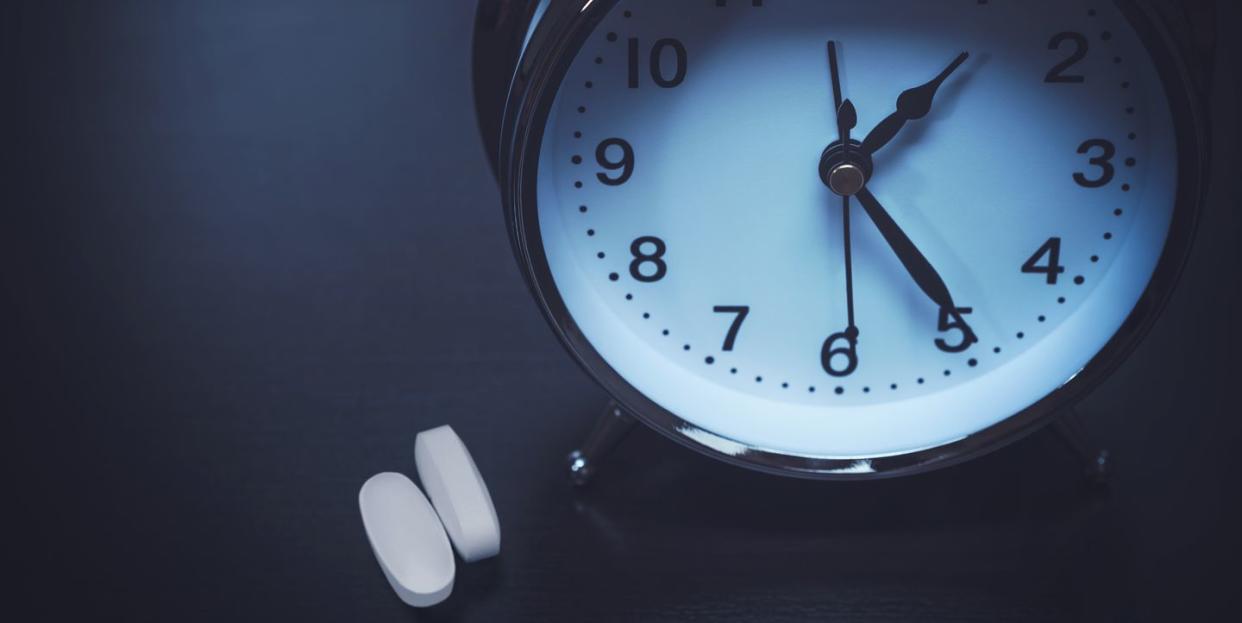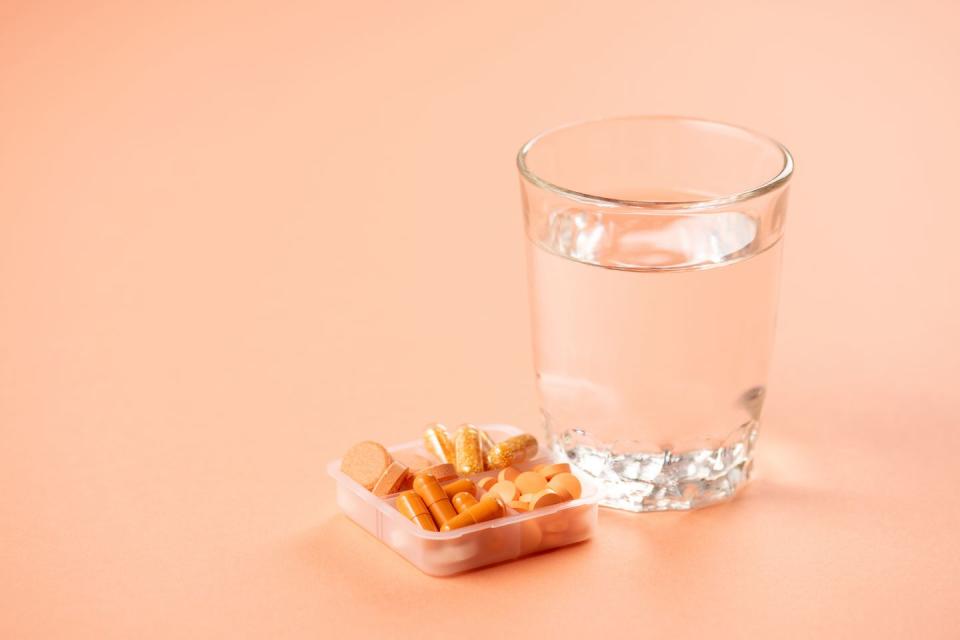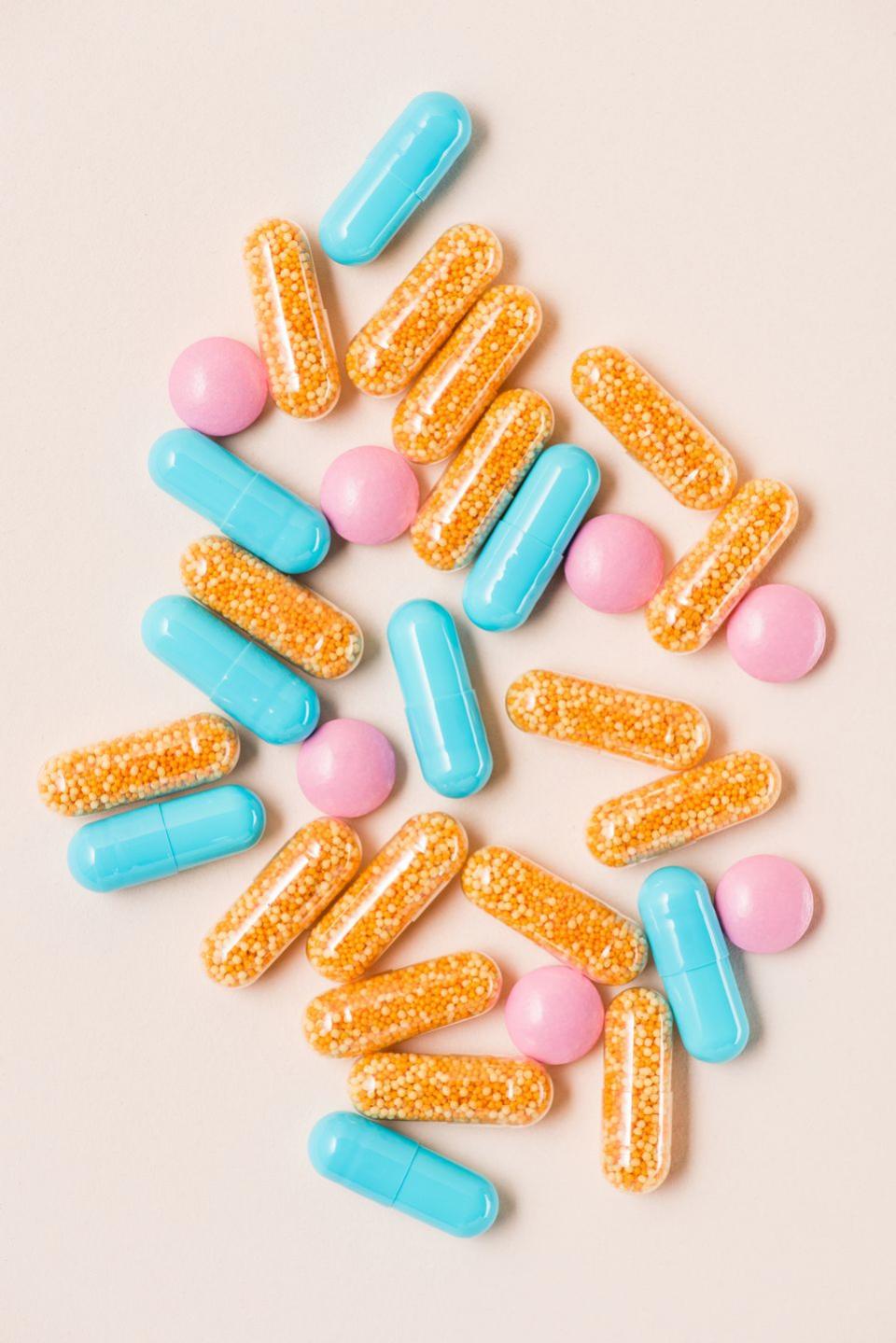What Neurologists Want You to Know About OTC Sleep Aids

Getting those coveted eight hours of sleep at night feels all the more elusive when you've had caffeine too late in the day or can't stop running thinking through your to do list. True life: It sends many of us reaching into the medicine cabinet for some over-the-counter sleeping pills.
Nonprescription medications like ZzzQuil and Unisom and supplements such as melatonin and valerian can help get your brain in a restful mood, but just because you don't need a doctor's note doesn't mean they're always the best choice. Sleep aids can interact with other medications you take, and lingering effects can also put your safety at risk.
With that in mind, here's how to navigate the pharmacy aisle and rethink your sleep routine if you're suffering from insomnia.
Are over-the-counter sleep aids safe?
Yes. Using an OTC sleep aid is generally safe; you'll just want to watch for a hangover effect. "Any time you take anything sedating there’s the chance you’re going to feel groggy the next morning," says Victoria Sharma, M.D., a board-certified doctor in sleep medicine and neurology at Sharp Grossmont Hospital. Because this hangover effect can up your risk for accidents, she advises against using anything that affects your alertness in the morning.
Taking the lowest recommended dose before a full night's sleep (not in the middle of the night) can help prevent grogginess the next day. Always consult a doctor first if you're pregnant, breast-feeding, or have liver problems, but everyone should follow these precautions with OTC sleep aids:
Ask your doctor if sleep aids interact with any medications you're taking.
Never mix sleep aids with alcohol, as it can increase the sedative effect.
Start at a low dose, especially with older adults, to avoid excessive drowsiness.
Do NOT give children sleep aids, unless cleared by a pediatrician.
OTC sleep aids aren't habit-forming in the sense that your body won't become physically dependent on them, but they're also not designed for regular, long-term use. Doing so can cause side effects like persistent drowsiness, confusion, memory problems, dry mouth, and urinary issues.
If you're experiencing chronic insomnia, visit your primary care provider to figure out it's a sign of something more serious. Sleep apnea, mood disorders, and thyroid problems can all cause sleeplessness.
What is a good OTC sleep aid?

Most OTC sleep aids induce sleep using antihistamines, but you'll also find popular supplements like melatonin and valerian in the pharmacy aisles. Here's what you can expect from each type:
Antihistamines
Common sleep meds like Zzzquil and Unisom contain antihistamines like diphenhydramine and doxylamine as the active ingredients. (The allergy medication Benadryl also contains diphenhydramine, which is why it can make you sleepy.)
"In the doses that are available over the counter, antihistamines are relatively safe and they work for a lot of people," says Pradeep Bollu, M.D., a board-certified sleep specialist and neurologist with MU Health Care. "They antagonize the alerting chemical called histamine in one particular region of the brain, and by antagonizing histamine, it makes people sleepy."
While these drugs may make you feel drowsy, they can also lead to side effects like dizziness, dry mouth, and memory or cognition problems and they're not designed for long-term use. If you suffer from restless leg syndrome, antihistamines can even make symptoms worse, so talk to your doctor before using any.
In terms of choosing the best brand, Dr. Bollu says that the bottomline is that the products all contain the same active ingredients. You can pick whatever you feel the most comfortable with, including generics.
A Note About Nighttime Painkillers: Skip antihistamine meds that also include ibuprofen (Advil PM) or acetaminophen (Tylenol PM) unless you're experiencing aches and pains. It's better to take pills with only the active ingredients you need.
Melatonin

Melatonin is a hormone produced naturally in our brains every day, regulating wakefulness as levels go up at night time and gradually go down early in the morning. In the U.S., you can buy melatonin as a supplement, but it's available as prescription-only medication elsewhere in the world.
The hormone has two effects on the brain. The first is weak sleep-inducing effect that only some people respond to. The second is what's called a chronotropic effect.
"What that means is melatonin can shift your sleep-brain rhythm based on when you take it," Dr. Bollu says. He compares it to teenagers who tend to stay up and wake up later than adults. Their sleep cycle is shifted in one direction. Taking melatonin can pull the sleep cycle backward. So while the supplements won't necessarily make you fall asleep, they will affect your sleep rhythm.
"Compared to a variety of medications used for insomnia, melatonin is a very safe alternative," Dr. Bollu says. "It’s very popular even among physicians, who start patients with insomnia with melatonin because of its good safety profile."
Both he and Dr. Sharma note that melatonin supplements come in a wide variety of dosages from 3 to 10 mg and recommend starting with small amounts. And while melatonin for the most part is okay for adults, the FDA does not regulate supplements for safety or efficacy. That means it's hard to know exactly what you're getting in each bottle. It's possible there's variability in dosage between brands and even within the same brand, or that the pills can contain trace amounts of other stuff.
Valerian
Valerian is a flowering herb native to Eurasia with medicinal uses dating all the way back to ancient Greece and Rome. Today, you'll find its dried roots and stems as a common ingredient in teas or capsules marketed as sleep aids. Out of the natural or herbal supplements available (including chamomile and lavender), valerian has the most studies supporting its sleep-inducing effects, Dr. Bollu says.
"Valerian root has been used for a very long time not just for insomnia but also nervousness and headaches," he says. Some research indicates this plant may have potential sedative and anxiety-reducing effects by increasing the neurotransmitter GABA.
"This GABA is an inhibitory chemical that makes the brain less active, and in sleep we all want our brains to be less active," Dr. Bollu explains. "So by increasing GABA, valerian promotes sleep and also helps nervousness."
As with melatonin, the FDA does not regulate valerian supplements or teas, so exercise caution if you decide to try it.
What else can I try?

While it's generally okay to take an OTC sleep medicine when you suspect that "decaf" coffee wasn't really decaf, the best way to treat insomnia in the long run is to address the underlying problems, Dr. Sharma says.
Her advice: Train your brain to associate the bed with sleep. "Do nothing in bed other than sleeping and intimate activities," she says. "No reading in bed, no playing with the phone in bed, and no laying in bed for hours not sleeping."
Don't shortchange other lifestyle remedies either. Try incorporating these tips into your regular routine and you might not have to hit up the medicine cabinet at all:
Establish a regular sleep schedule: Go to bed and wake up at relatively the same time every day.
Avoid caffeine, alcohol, and large meals before bed.
Get active: Daily physical activity at least several hours before bed can promote better sleep later on.
Use a white noise machine: Dr. Bollu's patients have reported good success with white noise therapy.
Put down your phone: The artificial light late at night can interfere with melatonin production.
Wear blue-light glasses: They help block the rays that mess with your sleep hormones.
Meditate: Some studies suggest medication may improve sleep.
Practice mind-body therapies like tai chi and yoga: They can help fight stress and enhance sleep.
('You Might Also Like',)

